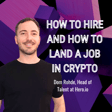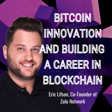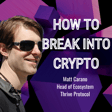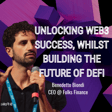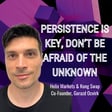Become a Creator today!Start creating today - Share your story with the world!
Start for free
00:00:00
00:00:01

Chris Dahmen, HyveDA - How Curiosity Turned a Helicopter Engineer into a Web3 Founder
From helicopter engineer to blockchain co-founder, Chris Dahmen’s journey is anything but typical. In this episode, Chris joins Jack to share how curiosity pulled him from the forests of Canada to the crypto hubs of China — and how that same curiosity now fuels his mission at HyveDA, a project redefining data infrastructure for Web3. They dive into what makes a great Head of Growth, how to break into crypto without a fancy degree, and why passion beats pedigree every time. It’s an honest, funny, and human look at the realities of building in the decentralised world.
Transcript
Introduction and Background
00:00:01
Speaker
Chris, welcome to the show. How are you? Mr. Jack, it's pleasure. Thank you for having me doing great. What about you? Yeah, good. Thanks, man. I'm good. Thanks for joining me. ah Chris, for people who don't know who you are, could you give us a bit of an introduction, please?
00:00:16
Speaker
Of course. So my name is Chris Damon. For those who know me, I am currently the co-founder at Hive, also known as HiveDA.
00:00:27
Speaker
Been in space for quite a bit. I'd like to say about seven to eight years. I don't really count the years at this point. um But weirdly enough, I started many, many years ago, back when I was living in China.
00:00:41
Speaker
So I'm originally Canadian. French Canadian from Montreal. ah So if you catch some time that some of my sentencing is bizarre, it's because it's not my my first language.
Transition from Traditional Finance to Crypto
00:00:52
Speaker
And yeah, so I traveled quite a bit around the world, spent many years in China where I really, really started to get deep in crypto. um And after that, just kept rolling all around the world, finally back to my own places.
00:01:06
Speaker
um So yeah, I'm all about DeFi. I'm all about infra. I'm all about people relation. And this is what I do. So, yeah. that was fun Sounds Could you give us a bit of a talk through of your career journey so far and maybe some of the roles that you've held leading up to this point of you being a co-founder now?
00:01:28
Speaker
Yeah. I mean, this part is interesting because normally when you ask this question to somebody who works in in fintech, you get pretty much like a narrow answer that's always the same. Like it's a prestigious university that leads into, you know, some so some type of like early job into high banking system. And then eventually they end up on Wall Street or any type of like highly organized, you know,
00:01:54
Speaker
big corporation and this
Roles and Contributions in DeFi
00:01:56
Speaker
path is very standard. But in crypto, when you ask this question, you get into a very, very bizarre adventure because most of the people who succeeded in this and this space have like the weirdest comeback.
00:02:09
Speaker
um In my case, I used to be an helicopter engineer. So that was back, I would like to say, 10 years ago. um You know, I had a full full-fledged career. I was traveling all around Canada, helping to kind of like design and fix helicopters. So that's that's most of what I was doing.
00:02:32
Speaker
And I hated this job. I hated this career. was It was a good one, you know perfect to make enough money to raise a family, have a house and have everything that everyone is theoretically seeking for.
00:02:45
Speaker
um But yeah, it was not for me. One of the big parts was it's a job that you always did in isolation. So it's all about being with yourself and being in the forest. And if you're somebody who likes fishing and likes to spend weeks alone
Growth Strategies in Web3
00:03:00
Speaker
with the mosquitoes and the trees, then it's the perfect job for you. But it was not for me as I'm a super social person.
00:03:07
Speaker
um And so, yeah, eventually I just decided that like it was time for me to flip the switch and do something completely different. And at that time, I had some very good friends of mine that were already nearby, let's say, New York and Chicago into more like, let's say, that the Wall Street world.
00:03:27
Speaker
I had pretty much no backup at this point, but what I had was a pretty good amount. So the ability to connect with people at at a deeper level And I was very, very motivated in meeting some intelligent people.
00:03:42
Speaker
And so at that time, it was very easy for me because of these friends to, I decided to move to Chicago for a while and met some of the friends ah basically that that had like private fund management.
00:03:54
Speaker
And so for something like two years, i helped out a lot of these guys initially just like writing some stuff, doing some translation, helping them build some courses and you know whatever jobs that they had, like I was kind of just helping them out of passion of it.
00:04:10
Speaker
And also because I was, I was having the ability, like I said, to sit in rooms where I could learn and learn and learn about some new stuff, which I always strive to. Um, so that was amazing.
00:04:21
Speaker
But the problem is, and, and again, I know a lot of people would hold a gun to my head saying this, but the web two space or the traditional finance space for those who you know spend time around it.
00:04:37
Speaker
ah There's a very evil evil vibe around that. And this is a personal opinion. Keep in mind that I'm not speaking the truth. I'm just saying
Innovations and Challenges in HiveDA
00:04:45
Speaker
my own truth. ah But it's definitely a crazy space with a lot of competition, a lot of There's something vicious and I just didn't like it ah because I love to communicate with people, sell if I have to sell, but I don't like to lie and I don't like to play poker face.
00:05:07
Speaker
And it's all about that. So yeah, for a while that was interesting, decided that this was definitely not the end game for me. Just took a flight. when all across the world ended up in China, decided to stay there.
00:05:21
Speaker
And I just were very, very lucky at that time to meet quite a bunch of super interesting people that were, I'd like secret to say crypto OGs. So people that started 2012, 13 and And these people just kind of like welcome me and say, okay you have the basic knowledge necessary to understand the key pieces of finance.
00:05:44
Speaker
And that was enough for me to really get deep dive into the DeFi space. And I fall in love with, you know, everything that was lending and at that time, specifically liquid staking.
00:05:57
Speaker
and all the key and components of DeFi and that landed me a job as and I was basically the right hand so I could like I could say co-founder but I wouldn't be correct I was more like the head of DeFi slash Yeah, let's say one of the core member of a project named Kian or Cyan, or people have tons of different naming for it.
00:06:26
Speaker
It's C-I-A-N. It's a very successful project today. I think they have over a billion dollars in TVL. and So I was one of the core founding members and helped you know build the ecosystem, the strategies online.
00:06:39
Speaker
So it was all about DeFi. um That was fantastic. And eventually I upgraded to, after like three years of this project, I decided to try something completely different. I was very curious about AI, obviously at that time.
00:06:53
Speaker
um And again, it's always this mentality where I try to learn what I don't. And one thing that I didn't understand was AI, was general compute, ah was all this, let's say, more techy stuff that bridge the world between Web2 and Web3.
00:07:09
Speaker
And so I decided I know nothing about that. I'm only a DeFi geek at this point. Let me learn some of this stuff. And so I found a company that was basically trying to
Advice for Crypto Newcomers
00:07:19
Speaker
build some infrastructure in the Web2 world, but tokenize it in the Web3 world. So somewhere of a slash, I would like to say between D-PIN and AI and RWA.
00:07:31
Speaker
So the core idea was to work with the Dubai government, quote unquote, like royal family, but also like the Japanese government to establish some supercomputers infrastructure in real life and tokenize the return and the investment funnel throughout Web3.
00:07:50
Speaker
So that was super interesting, but I didn't do that for super long um for some reason that I may expand on later on. but at the end of the day i just met one of the most incredible person that i had the pleasure to meet in this space a man named dawi who became my co-founder or to be ex exact i became his co-founder because he was the one with the the architectural brain needed to to spawn this beautiful infrastructure project that we're working on today and that's it i pretty much
00:08:23
Speaker
highlight the last 15 years of my life, but that would be the path with some very minus, ah ah let's say, shortcut. Sounds cool.
00:08:33
Speaker
Sounds like
Building a Career in Crypto
00:08:35
Speaker
that curiosity that you've had has really like helped you get into those those positions, right? Always wanting to learn, always wanting to explore something new. And it sounds like a real key skill ah that someone needs to learn, really.
00:08:53
Speaker
Yeah, well, it depends, right? I say that every person has a different mentality and different dream. um And that that is something that I believe wherever you live or whatever, what's your age, I think it's very clear. You can clearly depict in someone if their dream, for example, is just to settle down.
00:09:15
Speaker
And I have a lot of friends like that who still to this day pretty much always have the same career and they live in the same place since they they were young almost. So, you know, they move the house next door.
00:09:26
Speaker
And they're super happy, you know, to be honest, they they got a dog, they got a kid and that's it. They don't aspire to do some funky things. ah Certainly not go live in China.
00:09:38
Speaker
You know, this this high is a high level of curiosity, but certain people will also call that dementia to some extent. My mom was not sure I was okay in the head when I decided to say, you know what, I got a good career.
00:09:50
Speaker
I got a successful life. I got a good job. i got a house. I got a car. Let me sell all this shit and just take a one flight ticket to China, not knowing what I'm going to do, not knowing where I'm going to live. And I don't even speak the language.
00:10:04
Speaker
um So curiosity is definitely a tool that can play phenomenal, phenomenal. Well, basically, that can bring incredible results in your life. But after that, it depends if you're about that life or not.
00:10:19
Speaker
So to your answer, I think, yes, but it depends who you are. Yeah, that's a good that's a good point. um And with
Engagement and Networking in Crypto
00:10:27
Speaker
HiveDA at the moment, you am I right in saying that you're on the like the growth side for the project? Is that like your main focus, you specifically, right now?
00:10:38
Speaker
That would be correct. Yeah. So quote unquote, I guess super officially my title would be co-founder. ah But again, it's just a title. in In essence, there's three of us in this team, like really making the foundation layer of this team. ah There's Rick, who's mostly responsible for everything that is more organized, organizational.
00:11:00
Speaker
Sorry, English is failing me here. ah Basically regarding the organization, how to deal with the everything that requires some type of organization, as well as the legal side, the paper side, lawyers and stuff, which is not my forte.
00:11:15
Speaker
After that, Dawei would be wearing pretty much the seal rat the CEO hat, as well as the CTO. So he' he's the one that designed this whole crazy architecture that we're were working on. And so he's a data freak, always has been since he's a kid.
00:11:35
Speaker
This guy got a pretty incredible story as well, but he started like deep, deep, deep into the tech space when he was 13. thirteen uh but like deep uh he's kind of a crack he's very young younger than me probably 10 years younger than me but we pretty much has like the same length of professional career which is insane to say ah But yeah, and so he's in charge of all the product and my position then would definitely be everything regarding the ecosystem, finding the people that will bring tons of money inside of our protocol because we need so to secure, let's say the crypto economy layer of the the engine that we're building.
00:12:17
Speaker
ah But after that, finding the people that we would be building on, so the partners, the whatever it is basically that that regards relation, building trust, building business avenues, that pretty much would be my realm.
00:12:32
Speaker
Correct. Cool. This might be quite a hard question to answer. So hopefully I'm not putting you on the spot too much ah with this. Could you give us a bit of a crash course on what makes or how to make
Conclusion and Future of HiveDA
00:12:50
Speaker
ah yourself a successful head of growth, chief growth officer?
00:12:55
Speaker
Like, could could you talk us through that a little bit? Give us a crash course in the actual role itself and and how to be successful at it. Hmm. I mean, yeah, I guess, again, this, this is interesting because if you were to ask the same exact question to somebody working in TradFi, there's very different method, I believe that are used to quote unquote, build a network, build relationship.
00:13:21
Speaker
Um, and it's definitely not something they're going to teach you in school, at least how to do it in WebTree. Uh, but the core. Yeah, let's put it this way.
00:13:33
Speaker
I think that the most essential part of this job comes, boils down to three points. The first one would be the knowledge. So whatever you're doing, whoever you're going to be talking to, whether it is a selling call, whether it's just to make friends, if you are to work in a space that you enjoy and you want to make friends with people in high places, to some extent, you got to be able to know what you're talking about.
00:14:00
Speaker
ah Because otherwise, what happens is you fall into this very easy trick where you're trying to sound smart, but you don't know what you're talking about. And the smarter people are, the faster they're going to detect that you're full of shit.
00:14:13
Speaker
So normally having knowledge is always good to some extent. So if you care, for example, in WebTree about DeFi, just get on your seat and deep dive some protocol white papers and try to understand what's going on in this space.
00:14:29
Speaker
So yeah, this one is pretty obvious. Knowledge is important. The second part I'd like to say is definitely your network. And by network, what I mean is you know, when you start, it's very difficult because your network normally is going to be near zero.
00:14:47
Speaker
um But after that, since your knowledge your knowledge is near zero and your network is is near zero, the only way that you can really come to let's say the foundation that is good enough to build on is to make some friends.
00:15:03
Speaker
And this part, like I say, is... Clearly not a something that they will teach you in university or anything, but a lot of it boils down to that. Most of the successful builders that I know in this space, um they all have something in common.
00:15:19
Speaker
People who have a lot of hunger about making things work, so they work very hard. But the second thing is the fact that they're able to sit in a room with pretty much anyone and have a phenomenal conversation, not only about technicalities, but about life.
00:15:38
Speaker
And that is something that normally between founders or head of growth, people that normally are the one leading a lot of the partnerships, You find that a lot of these people are just genuinely incredible person that you can sit in a room and talk for hours and just forget that there's business on the table. and when you're able to develop that, then after that, it doesn't really matter what you're selling.
00:16:04
Speaker
because there's already a connection point. and people that are your friends will be will be super willing to introduce you to somebody else who might be in a high places just because they know that, you know what, you're a fun guy, you're really cool to talk to, I enjoyed this conversation, let me introduce you to this other friend who, whatever his position is,
00:16:24
Speaker
might be from the same type of vibe, you know, or have some similar interests. therefore, it just becomes the same way that if you go in a party and you get introduced from a friend to another friend to another friend, just because the vibe is right.
00:16:37
Speaker
um In this business, it works. It genuinely works. You're going to get into places, talk to some nice people. they're going to remember you. They're going to be willing to talk to you anytime. And if they have to introduce you to another friend, then they will do so.
00:16:51
Speaker
And so that that that helps. And the third aspect, which I think is the most important is, well, no, equally as important, let's say, is not be shy.
00:17:04
Speaker
Yeah, not be shy. It's very badly titled. ah But when it comes to this space specifically, a lot of time you're going to have business ideas.
00:17:16
Speaker
For example, you're thinking about, i don't know, you want to do a partnership with Lido? Okay. Or Aave, you know, some of the biggest protocol in the world.
00:17:27
Speaker
And you think like, okay, those people are incredibly powerful. I don't know how to start the conversation. Nobody will ah really introduce me to them. And I'm insignificant. So how would I approach these incredibly powerful people with my small project? and And so basically you create some psychological barriers not to do so.
00:17:50
Speaker
And I think that one of the biggest drives that a lot of successful BDs in this space have is they're not scared. They're not scared for all the previous reasons that I mentioned, because they know what they're talking about. And so they're confident to talk because they are they have a good vibe and they know that even if the business call doesn't go well, there's still a way to potentially become friends.
00:18:13
Speaker
and catch on in an event later on, or just have another call because guess what? You care about that. I care about that. That conversation was fun. Let's do it again. And it's not so different for the people that work in those high companies. They're just genuine people who care, who are passionate.
00:18:29
Speaker
ah you know the The bigger the company normally, the more passionate and and the more drive those people have. And so if you can share that you care about that, then you just have some great ideas, then don't hesitate.
00:18:42
Speaker
Just go, just shoot some DMs or do whatever is necessary to um establish a communication. And from there, you'll see. And sometimes it doesn't work. I mean, often it doesn't work at first.
00:18:54
Speaker
And it's perfectly fine. you Now at least they know who you are. And eventually you just cross paths again in another chat or whatever and say, we met.
00:19:05
Speaker
You know, conversation was not fluid the first time, but at least I know who you are. You know I Yeah, sure. And now, you know, it's it's easier. It's easier. So, yeah, I think those would be my three advices that normally would lead you somewhere.
00:19:22
Speaker
I like that. I like that a lot. So that's ah so yeah, grow your knowledge, grow your network. I just don't be shy about reaching out to people that you want to partner with. I think that's really, really good, really good piece of advice. Out of interest, what do you reckon when when when you have created some like great partnerships and gone in front of the right people, do you tend to find that it works?
00:19:47
Speaker
Uh, which one at the second and the third one between either your network and just not being shy and reaching out to people, which you think works better in web3?
00:20:00
Speaker
Hmm. Well, in essence, I think that, yeah, it's complicated. I really want to be objective here, but I'd like to say that every single one is as equally as important.
00:20:14
Speaker
um not being shy perhaps is the most important in knowledge, right? So you can be a nobody saying that, nobody is saying that, let's say you don't know a lot of people, but you can...
00:20:27
Speaker
build something extraordinary and know every piece of it on the tip of your finger. So obviously there's going to be passion when you speak about it. um And if you have the ability and to reach out. So basically the third point is complementary to the second point, which is if you have a really great network,
00:20:48
Speaker
introductions are going to get easier and easier, right? Because I want to reach to this very powerful guy. If I just go in his DM on Twitter or Telegram you know, whatever platform, the worst one probably being LinkedIn, you're just going to be reaching out in a DM and it's going to go nowhere because this guy is going to automatically scan you. This is what I do every day when some new people's scan me on Twitter, I would look like how many people that I know that I follow who are friends of mine also are connected to this person.
00:21:21
Speaker
If it's zero, normally it's very likely that I'm not going to be paying a lot of attention to this message. The same thing goes on LinkedIn, even though LinkedIn is so incredibly butted that even though you have 50 friends in common, it's very likely that I just gonna, you know, and I apologize if I did that to some great people, but I mean, it's the reality. You got to filter off at some point.
00:21:43
Speaker
um And the same goes on Telegram. If we share no groups in common that, You're not in like those, you know, it's it's harder. you've You got to divide your attention. But at least if you have the courage to reach out, the possibility that you're going to be landing into some valuable conversation and specifically if you can demonstrate quickly that you know what you're talking about.
00:22:06
Speaker
And by knowing what you're talking about means you also understand what they do, right? So I can know everything about my business and I call you to do business with you and I don't understand anything of what you're doing.
00:22:18
Speaker
then the call is going to be five minutes and it's done. So you got to be able to know what they're doing, know what you're doing, understand what's the problem, understand what's the issue, how your problem, how oh your whatever you're selling or whatever you want to partner about so provides some type of solution and and the path to set solution.
00:22:38
Speaker
So what do you need? You need money, you need time, you need support, you need a friend. ah You got to be clear on these things. And if you can be extremely direct, dack da da then you can definitely grab the tension.
00:22:52
Speaker
So perhaps the network is less necessary if you're really, really wise and that you're not afraid to reach out, I would say. But the other is kind of like the cherry on top. If you have a network, then everything is just easier, obviously.
00:23:06
Speaker
Yeah, they complement each other well, I think, for sure. I'd agree, yeah. And then and you you mentioned that. Obviously, it's important to understand what the other person does.
00:23:18
Speaker
um Could you talk us through it? Like talk us through Hive DA, like what you guys building. Could you talk us through the project a little bit more detail? Of course. And you know, the irony about this question is... um I found so incredibly complicated to introduce ah this project, not because I don't know what we're doing.
00:23:38
Speaker
ah So now I would basically be lying saying, you got to know what you're talking about. And and then I'm saying like, it's complicated. The reason I say that is because we are building something that do not resemble anything in the space.
00:23:53
Speaker
It's a combination of different things. And so when explaining this project, what is something that what is very easy sometimes is you can use some example or some analogies to say, like, here's what we do.
00:24:04
Speaker
And people very quickly understand what's going on. In our case, it's a bit more complex, but I'll try to keep it as ah less technical as I can. Essentially, we are building a data layer.
00:24:20
Speaker
ah So the right word would probably be a data fabric. And what it means is that we are trying to bridge a critical issue in the space.
00:24:31
Speaker
so The blockchain industry is is phenomenal for one thing, ah term that everybody everybody loves and everybody hates at the same time, which is the term decentralization.
00:24:42
Speaker
So why caring about the ledger technology is because it is quote unquote decentralized, right? So this is the big difference instead of using the bank. So the bank, they decide they don't like you for any reason. you know There's a lot of way that your money can be froze up.
00:24:59
Speaker
Whereas in the blockchain, as long as you have your ledger, you don't need to KYC. You can go from China to Canada to Indonesia. doesn't matter. Your money is always with you in your pocket and you're free to, ah you know, offload as much money as you want. It's yours.
00:25:16
Speaker
ah So for all the great reason, we like decentralization. However, The blockchain itself and not all blockchain are decentralized. Let's let's be very clear. But for those who are decentralized, let's say Ethereum, ah it is phenomenal.
00:25:32
Speaker
And that they each blockchain has something called well there's a certain data function right so in the ethereum for l2s for example there's something called the blob space and you it's a way to kind of like verify the transaction on chain uh to kind of delay until a block is created so you have an l2 that there's tons of transaction happening in a parallel space of the ethereum layer and until all the transactions get rolled up and sent into the ethereum blockchain and the block gets created so that
00:26:08
Speaker
the data is safe forever, you need to have some type of traceability of like what's going on inside of this blockchain so that the state of the blockchain can keep on operating.
00:26:19
Speaker
And so that's why ah the term data availability, which is this function of the blockchain to have like kind of a constant memory of what's going on before the block really gets created. And so now it's written forever.
00:26:34
Speaker
um So you need this traceability, this verifiability at all time, or you can call it transparency at all time, that everyone can go and check the status of the chain at all time, whether or not the block was created.
00:26:50
Speaker
Now, this is a very like a vulgarization of what data availability is, but high in essence is a combination of that and what is also called transient object storage.
00:27:05
Speaker
Now, transient object storage refers to and this is the issue that i was trying to introduce to awa s3 so i'm sure you already heard of awa google cloud ah there's another very popular one named cloud fair cloud flare r2 so these solution what they do is they allow for an enormous transact of data to get stored and be accessed and read in real time extremely fast
00:27:39
Speaker
Now, the whole reason why I made this very complex introduction is to explain that in blockchain, the blockchain mechanism and the data availability layer and all everything that relates to the blockchain data is efficient, but is far from being efficient enough and cheap enough.
00:27:59
Speaker
And it doesn't matter if we're speaking about like the high throughput blockchains like Solana or you there's names like MegaE per se. Oh, it's so fast. It's like, it's fast. it's cheap but it's not nearly fast and cheap enough and and let's say the finality is not fast enough so that you can really drive for some high throughput application like for example ai so there's tons of projects like ai like gamify like deepin treasury management all of these have enormous amount of data that they do not store on chain
00:28:37
Speaker
and the reason why they don't do that again is because if they were to use Unchained transaction, even though a blockchain is cheap, it would probably cost them $40,000 a day just to transact this basic data that they have inside of their system.
00:28:51
Speaker
So what do they do? They use centralized solutions such as AWS S3, Cloudflare R2, and Google. right they They have some functions of that.
00:29:03
Speaker
And so what I just explained here is the fact that you have this beautiful um decentralized layer that we're all using and we say we care. And so we build on top of it saying that our product is decentralized. But the reality is, and I'd like to say about 90% of the project are using centralized solution to compensate for the weaknesses of the blockchain.
00:29:26
Speaker
And in essence, it's a problem. And there never really was a solution that is able to effectively replace the centralized component in a way that is decentralized.
00:29:39
Speaker
And it took us a better part of two years to really, really confidently say like, okay, we did it. We came up with this project and now it's about to go up.
00:29:50
Speaker
ah But in essence, that's what we created. So it's a replacement layer. for quote-unquote data availability and transient object storage that can act as a realistic replacement for centralized hot transient object storage um in yeah so we basically cut this undesirable bridge that exists between web2 and web3 in essence this is it' so very bad ah perhaps a too long of an introduction but like I say it's a complex subject to to introduce in few lines unfortunately otherwise people just have no idea what you're talking about that's good I think uh I think the introduction is good um I've always wondered appreciate it yeah no I've always wanted to be honest how um how that's worked like where that data or how that data is stored so that you can validate transactions on the blockchain before like app blocks have actually been
00:30:51
Speaker
uh created um so yeah no no uh your your uh your explanation made made sense it made sense to me anyway so and i'm not the most technical person in the world so uh yeah i think you've done a good job at explaining it there this this is beautiful i do really appreciate that jack because to be honest that's that's one of the challenges when you're building something like uh even a text is complicated, but you know there's there's some projects that are fairly simple to explain. And that I consider to be, you know it's it's hard to explain that without getting incredibly technical.
00:31:23
Speaker
And so the challenge for me is how to explain it in different languages and at different level of technicalities. And yeah, I was trying to kind of like make a long explanation of like, here's the base functioning. Here's the issue.
00:31:37
Speaker
Here's how you fix it. But it requires quite a bit of time, unfortunately, to do so. But I'm very glad that it sticked. ah Yeah, exactly I guess to be honest, though, I guess i guess your product would be quite a almost like quite a B2B type product. Like you're dealing with a lot of developers, right? Like guys who are actually building a blockchains, creating blockchains. So a lot of those guys would be used to dealing with the technical language anyway. Like, do you have to like dumb the language down for normies? You don't, ah people like me, like don't understand ah like super, super deep technical stuff or, because I guess if your audience understands it, it's probably okay, right?
00:32:17
Speaker
Yes and no. ah You'd be surprised. Like a lot of the calls that I go on, because that's the thing. Okay. So the complexity is that, you know, in this long introduction that I made, I emphasized the fact that about 95% or 90% of the project currently building in WebTree are using to some extent AWSS-Tree in the background to compensate for the data needs.
00:32:42
Speaker
And so what it means is that have to realize that a lot of the project in blockchain the people that represents it like when I called somebody let's say I reach out I don't want to say a name but I reach out to a project I don't get to call to this I don't I don't get to have the phone with the CTO on the first call so most often you're going to find you know at this level I'm going to reach the head of BD or perhaps sometime the CEO and The complexity is that you'd be surprised. A lot of the people have a vision of what they're building. They understand what is the value per position. They understand how to combo up.
00:33:23
Speaker
They're not used to talk of the tech side of it. And if anything, very often they're going to know the tech on the blockchain side, but they don't know the side that they come and compensate on.
00:33:37
Speaker
And so very often people say, oh, i'm building on this blockchain and this blockchain is an L2 and it has like that amount of throughput and that amount of transaction per second. And, you know, it is ah it is secure because of this, this, this, this. this But they might not necessarily know if they're using AWS S3 in the background or no.
00:33:57
Speaker
And very often I find myself in a room with person when I'm saying like, Look, I understand what you're doing. I can ensure you that you're using that because it's impossible that you're using blockchain for the needs that you have.
00:34:09
Speaker
And people are like, no, I don't think we use that. And I'm like, yes, I think you do. Go ask your CTO. And people are like, oh, shit, we do use AWS. What the fuck? I thought we were decentralized. And it's like, well, it's not really, it's not, you're not like lying to anyone because most people do.
00:34:26
Speaker
Like I say, it's a taboo. A lot of people have to compensate. So it's not as easy as you think. Sometimes I have to to go in room and like I say, force my way to say like, look,
00:34:39
Speaker
I bet that you don't know that you're using some centralized pieces to run because your CTO would not like to mention it, but everybody does to some extent. Not everybody, but, you know, a lot of projects that are outside DeFi, for example, are using some type of centralized tech to, like I say, do their business in a way that is efficient.
00:35:01
Speaker
specifically Specifically at the beginning when you're not making a lot of money, you don't want to be spending no $3,000 per day just for data, you know. Definitely. And I guess if you guys can, and I guess the challenge is to try and make it as cheap as the major providers like AWS and Cloudflare and stuff, right? that's the That's the trick.
00:35:24
Speaker
I guess a lot of people would love to love to be using like fully decentralized ah tools to to build their protocols. but um as you said, like cost is a is a big factor, right? Especially if someone's just starting out, might raise a bit of a seed round or something, they don't have bottomless pockets to pay for all this stuff.
00:35:43
Speaker
um So yeah, if you guys have solved it, sounds sounds like good ah sounds like a good challenge to have solved. Yeah. Well, again, you know again Sometimes I'm saying stuff and I hate myself for saying that, but I do genuinely believe that if properly implemented, ah we we can be looking at some, what we call a paradigm change, paradigm shift.
00:36:09
Speaker
um Because yes, we're talking about like a technology, a replacement technology that And it took us a lot of time to ensure that that was possible, but to make it as cheap as AWS.
00:36:22
Speaker
um But more specifically, what it would create is what it calls this economic flywheel. Whereas see Web3 as like this bubble, right?
00:36:33
Speaker
And we have like this money inside of this bubble living there from fees that you're paying to Ethereum when you does it when you do a transaction and this fee remain in Ethereum. It goes to the operators and the operators, they go on decks and they do stuff. So as long as the money is kept inside, it's good for us.
00:36:50
Speaker
But as long as when money gets extracted outside of WebTree, it's obviously not great. And so what happened in this current situation is, like I say, let's say 90% is the right number, then 90% of the application are paying, don't know, I'd like to say perhaps a million dollars week to AWSS3 Cloudflare R2. And this money just gets extracted forever, never to be seen.
00:37:16
Speaker
And so what we have the ability to do now is to make the satellite and this engine that lives in peri... I'm trying to say too much funky words here, but living within, ah you know on the border of Web3 and Web2, is able to provide this alternative solution.
00:37:33
Speaker
And one of the key component of Hive is that not only it offers decentralization and the verifiability and all the beautiful things that we love about this industry, But what it does, I saw, is all the fees that goes to Hive gets reinjected directly into web because we don't make profit as a company.
00:37:51
Speaker
The way it is, it's called a protocol and a protocol is quote unquote, a decentralized kind of a nonprofit organization. And so essentially all the fees, let's say we have like $10,000 that go within the engine for a day to pay for the data need.
00:38:08
Speaker
All these fees go back to the operators, all the decentralized operators that runs it. So none of them is us. ah Contrary to a lot of blockchain where people run their own nodes, it's not the case for us. We run on symbiotic ah universal staking.
00:38:23
Speaker
And so it's all decentralized operators that work together and people like you and I that go to the operators and say like, look, I care about Hyde. I think it's a great project. I want to support it.
00:38:34
Speaker
And then you provide some of your assets that get... distributed amongst these operators. And so basically all the money that goes to the to to Hive then gets paid back to the operators and the stakers, 100% of it.
00:38:51
Speaker
So then you would create this paradigm shift where the bubble itself would wouldn't have to leak ah all this money outside. of Web3 sending to Web2 forever, but could instead keep all the economic value within itself.
00:39:07
Speaker
So, yeah, so it's an exciting thing. But again, it's ah it's definitely a challenge to try to introduce this brand new paradigm and and make it a reality and convince people and explain to them how it works and why it works.
00:39:21
Speaker
But it's ah again, it's a fun challenge. And that's why I'm here. so Sure, man. Oh, I'm sure you'll do it. You're passionate about it. And it sounds like you got the right people in place. So I'm, uh, I'm sure you guys will do it.
00:39:33
Speaker
Um, I hope I'm able to demonstrate the passion that I was talking before. Like I say, if you care about what you're doing, it's gonna be easy to pitch. I know I was supposed to explain it for perhaps five minutes and I went for 15 for no reason. It's just because it's fun to explain for me. I, I, I, I goddamn love it. And I find it challenging for all the good reasons.
00:39:52
Speaker
That's good. It's good. I think that's a good mission. And ah yeah, that's good. Good for you to talk us through it. um You mentioned a few things there about the actual like industry itself.
00:40:05
Speaker
um Just to divert slightly aware a questions that's come to mind, like what is there anything that you think people should be aware of about the industry overall before they become a part of it? Like, say if someone's looking to join and get a job in the industry, they haven't worked here before.
00:40:25
Speaker
um Is there anything you'd like to make them aware of that you think is super important that they need to know before before coming?
00:40:36
Speaker
Hmm.
00:40:41
Speaker
Well, yeah, that's that's a great question because now my my mind is just bombarded with different thoughts. um The first one is I'll just go as it comes because I think I don't have any structured answer for that.
00:40:57
Speaker
ah One of the greatest things about WebTree, which I love, is the fact that, for example, I got a cousin and I got some, let's just say my cousin here, he's working, but he's been studying in finance, right? So he's it at university learning content and stuff. I don't know exactly what it is, but I know it's related to finance.
00:41:17
Speaker
And... He knows nothing about Web3, right? And he was telling me like, oh, I'm going to finish university. And after that, I probably get like a like this part-time job at a bank. And it looks horrible. And I'm depressed already thinking about like me spending.
00:41:35
Speaker
ah I think, yeah, it's just, it sucks. It's like hours, hours on the desk trying to call people that don't want to talk to you and you're trying to sell them stuff that they don't need and it's just horrible and he hates it.
00:41:47
Speaker
And I told him, I said, listen, man. Sounds like recruitment. Yeah, yeah. It sounds like, ah yeah, would you like to join my church? And it's like, you know but you're getting paid and it's this very strict environment with people who are all dressed like they're the president and everybody thinks they're they're more important than the other and you know my my cousin is a humble guy doesn't want to play this game and so one of the points that i wanted to say about this industry is what is the most beautiful thing is that you don't need specifically to have like some very high degrees in order to find your way in this industry and find your way in a so significant fashion in this industry.
00:42:26
Speaker
Because like I say, a lot of what matters is your knowledge, passion your your network, and eventually as well, like your ability to just charge and and make your way into people. If you have some of these points, like let's say two out of these four points that I've mentioned,
00:42:44
Speaker
It is only a matter of hunger you're going to be able to find your way into a significant career in this space. Because it is new, because it is still yet unexplored.
00:42:56
Speaker
ah it's not It's not something that you can learn, quote unquote, at university, or perhaps now there certain places that teach us that. But a point is that It doesn't matter what your background if you have the desire to learn about this industry, you can find a way and work with very respectable companies within two or three years.
00:43:17
Speaker
If you really put the work in and learn about some specific, you specialize yourself in something. So you care about lending platform. Just learn all the lending platform, learn the mechanism, mechanism go and chat, chat with people and boom, voila, you're going to you're going to find a job, um which is not something that you can say about, you know, being a doctor, being a lawyer, being a banker. Like you have to go through a very narrow, predefined process.
00:43:43
Speaker
So that's probably the best thing that I can say about this industry. And it's not a warning. There's obviously some warnings. um But I would say very briefly, some of the warnings is regulation.
00:43:56
Speaker
It's not a space that is clearly defined. So if you live in a place like I live right now in Canada, you got to be aware that it's going to be tricky. There's some tricky line that you need to navigate. What...
00:44:08
Speaker
you know how to declare your money how to not you know red flag the government because as soon as you meant to mention crypto they still think scan and it's like well it's not but it's the old school mentality these people you know in high offices most of the time they they don't know nothing about the technology and so they just stick to the the story they read in in the newspaper four years ago saying that some you know traffickers were using bitcoin uh yeah that's the thing you got to be aware regulation are tricky
00:44:40
Speaker
Yeah, I think that's, yeah, I think that's a big one. And that, that varies quite a lot, right? Across the world, wherever you are and wherever you're trying to get into it, the regulation will be completely different probably.
00:44:51
Speaker
And, and I think that's quite a, uh, It's quite a tricky thing to learn, probably. Like, is there anywhere that like lists like certain regulations in different countries, like what you need watch out for, what you don't, what does alert people, what doesn't, like this kind of thing?
00:45:10
Speaker
It probably isn't, really, unless you just Google it and read a ton of articles about stuff. I mean, when it comes specifically to crypto, I'm afraid, and again, I don't call myself a regulation expert, but I'm afraid that there's no...
00:45:25
Speaker
there's no whitelist board or char it chart. You can go on and just see if your country is like friendly to it ah because there's there's always some false reading. you know If I look in Canada, for example, they're going to say, like oh you know there's this setup and like we're welcoming crypto to some extent and you're going to read some very different news. One place, they're going to tell you it's all good. The other is going to tell you it's all bad.
00:45:49
Speaker
And then you don't know. And then you ask your lawyer or you ask your accountant because that's what you do, right? And they tell you, to be honest, I only know one guy that was super wealthy in crypto and he left the country.
00:46:05
Speaker
So you're like, well, okay. no And so it's it's very difficult. And I'd like to say the best way to know. if if it's like viable or not, just again, start learning.
00:46:19
Speaker
Start learning, go into communities, go into discords on Twitter and you're going to find some information there. And eventually you're going to meet some people in your surrounding area that are doing similar things or care about similar things. And you're going to be asking them some advice. and Some will tell you, well, I know this person that does it this way. I know this person that does it this way. And eventually going to find a path.
00:46:41
Speaker
It's not incredibly complicated. There's always a way. just that you're going to be paying a lot. That's all. Taxes are are very hungry when it comes to crypto. Yeah, definitely. Depending on where you are in the world.
00:46:53
Speaker
Some places better than others. um you mentioned ah You mentioned there about your ah your cousin, i think you said like looking to ah to get into crypto.
00:47:05
Speaker
um Again, this might be quite a difficult question, hopefully not putting you on the spot too much. If you were to then advise your cousin to give him a bit of a step-by-step guide on this is how you get that job in the industry, what steps would you tell him to take? Like anything that that springs to mind?
00:47:28
Speaker
Well, yeah, it's it's not a challenging question because I think I did exactly what you just said ah probably a month ago. Okay, fine. this couple this situation Yeah, this conversation was early and it was exactly what you think it was. Like I say, cousin sit down with me and he's like, look, I almost finished disagreeing.
00:47:46
Speaker
And I'm already depressed thinking about it. you know What's my career path is going to be? Because I have some friends a bit older than me. They're already there and everybody hates their life. you know It's like, what's going on, Chris?
00:47:58
Speaker
I see you're doing weird things. I see you're traveling all around the world, having fun, meeting cool people. How do I do that? And the answer, like I say, I kind of already layered up. But if I try to structure my answer here, it would be, first of all,
00:48:14
Speaker
Know what you care about. You got to become good in one thing because crypto is incredibly complex and incredibly diverse. So crypto is not just about, you know, Bitcoin or it's not just about NFT.
00:48:28
Speaker
There's much more out there. ah So. You got to find something that interests you because again, otherwise you're never going to be learning anything if it doesn't interest you. But if it can be DeFi.
00:48:40
Speaker
So DeFi is like traditional finance, but implemented in a way that is decentralized and way, way, way more modular. So you have tons of ways to create money by For example, if you're on the DEXs and you put your asset in a place and it combines to another asset and the more people transact, the more you make fees and then you can take this token and you can tokenize it and put it in a staking and then it will go into restaking and then you can loop this restaking. There's incredible ways to be, ah how to say, imaginative, creative would be a better word um on
00:49:18
Speaker
what to do, but you have to care about that, right? If you don't care about numbers and you hate finance and you hate to make money, who does? But you know what I mean? Like DeFi is not the thing here because it's very complex and it's it's very diverse. So you got to learn tons of different mechanisms and how they interact together.
00:49:36
Speaker
But if you do learn DeFi, oh God, you're you're in for some fun because now you know the foundational pieces of of this technology. And after that, you can pretty much be relevant in any room.
00:49:48
Speaker
But if NFT is your jam, then just learn everything there is to know about NFT. And so number one, find what you care about, right? Find something that passionates you, whether it is DeFi, NFT, AI, whatever it is.
00:50:04
Speaker
After that, try to find the project that are the most relevant in this space. So if it is DeFi, for example, then you would like to learn about AVI, which is the biggest lending platform. You would like to learn about LIDL, which is the biggest LSD platform. You would like to learn about Uniswap, which is the biggest techs.
00:50:21
Speaker
You would like to learn about... like that but So on and so on. So try to familiarize yourself with some of the most successful business in this realm. Now, once you understand how they work and how they collaborate with each other, you're going to have a very, very good sense of um basically how this whole scheme is working.
00:50:43
Speaker
Now, the third step, I would say, is yeah familiarize your set yourself with the ecosystem. So that would be specifically go into their respective Discord, which is a place where people meet and talk.
00:51:00
Speaker
you know whatever there is to talk with in this community. ah so Often it's going to be about some changes that are incoming and people are voting to take decision in what we call it the Centralized Autonomous Organization or DAO.
00:51:14
Speaker
ah People gather up and they discuss you know challenges and solutions and ways that we can implement them and blah, blah, blah, blah. But if you if you get to be part of this conversation, you obviously very rapidly gonna start to understand how those operations are working and you're gonna start making some friends and so again you learn about your passion you get to learn some of the biggest name Then after that, you find ways into the community so that you really can understand how they operate within the inside um and as well as as as meet some of the people. And then after that would be number four, which I think is the most critical is you try to find your first job.
00:51:58
Speaker
And so now leveraging what you know and the people that you know within the inside and and on or understanding the mechanism mechanism, you might not be able to work with these big companies from day one, but you can definitely find some knockoff of these companies. So, for example, AVI being the biggest lending platform,
00:52:19
Speaker
now there's a new blockchain that will have their own lending platform this whole lending platform is obviously not going to be as successful as abby but they're to be using some similar mechanism because most landing platform are to some extent copying either Aave or Morpho or some of the other and they're just copying their code base and they're putting out there.
00:52:41
Speaker
Now these team these teams, they need people who understand their project, but most of the time because they're a new project, they're kind of obscure, nobody really knows about them, the people they get access to going to find some people you know that have perhaps some experience in blockchain, but they don't really understand how a lending platform works. like there's no There's not many experts of lending platform.
00:53:07
Speaker
But if you are, then you just knock at their door and say, look, I already know everything about AVI. I know everything about Morpho. I know everything about all these other lending platforms. I understand exactly how yours is going to work.
00:53:22
Speaker
Do you have a job for me? And you'll be surprised how much the door will be opening fast because if you know what you're talking about, and again, you're not scared, so you're just knocking out their door, already they're goingnna be starting to pay attention.
00:53:35
Speaker
And if you knock the first job, then after that, it's just a question that every six months or every year, try to find something that perhaps will be you know more fitting the direction that you want to take, or perhaps this one will be the winner one for you.
00:53:50
Speaker
But yeah, that would be my ABCD, how to find a job in crypto. I love that. I love that. ah That step by step guide. think that's really important for like people to hear because
00:54:05
Speaker
It does take to find the right opportunities and the best opportunities. It does take time. You can't just apply for things online and just hope that you're going to get a job because you're going to be up against people who are really, really passionate about working in this industry. Right.
00:54:21
Speaker
And if you if you're a company hiring, most companies will always, especially in Web3, Web3 specifically, really a lot of the companies will hire based on how passionate and how like, uh, crypto native is the phrase, right. That people use like how crypto native someone is. And like, if someone knows exactly how like using the end of protocols, and as an example, someone knows exactly how they work the ins and outs, that kind of thing, but they don't necessari necessarily have quite as much experience as someone who has no idea about how they work, but might be good at the job. but
00:54:55
Speaker
I know, I've seen a lot of projects go for the person who just knows a lot about the protocols themselves and knows a lot about the inside of them and how they work and they can think, oh, we can teach the skill, but we can't teach the passion.
00:55:07
Speaker
So you are up against people. ah but isn't That's not a hard and fast rule, but it happens often, like very often. Definitely, you're right. And I mean, it's ah it's a brilliant point that you're you're highlighting there because it actually gives me the chance to provide another advice, which is...
00:55:28
Speaker
Don't try to fast track your way into going you know on some website website that have like some some job offers because you're not going to nail any of them at the beginning.
00:55:40
Speaker
If you don't have any experience in crypto and you like, again, it doesn't matter. You're going to go on those websites. going to say like, oh, there's a job at Coinbase. There's a job at this project. there's a Like they're going to look at your resume and going to say, this guy is trash.
00:55:54
Speaker
That's not how you're going to land a job. It doesn't work this way. And the only way it works is, like I said, for me, if I wanted to find a job, and then I could go to these recruiters and whatever. and I just say, look, I worked six, seven, eight years in this space. I did this. I did this. I worked with them.
00:56:10
Speaker
I'm friends with this this, this, this, this. I just do some name dropping and I can land a job. But you don't you don't get to do that at the beginning. So at the beginning, like I say, forget about these recruiters, forget about these platforms that tell you job opportunity.
00:56:25
Speaker
You will not find a job. The best way to find a job is the ABCD that I said, because as you say, I'm right. Let's say that in my community, Hyde is super, super technical. Not a lot of people.
00:56:38
Speaker
Well, nobody actually can say like, oh, I used to work at a company that does exactly the same thing. It doesn't exist. But if i if there's a guy in this chat who's like 20 years old who happened to just really like what we're building and reading the document and the white paper like over and over again and doing his research and he knows exactly how DA works and how it can spread and with who they could do business. And this guy is just in my Discord, ah you know, dropping suggestion and over and over again. I'm like, this guy knows what he's talking about. That's impressive.
00:57:14
Speaker
I don't care if he never finishes his elementary school. I will be offering him a job. So would you like to be an intern? You know what? Because I think you have like the passion, the drive, and you care enough and you understand enough so that I could go get like this ex-employee that used to work at Coinbase or Binance.
00:57:34
Speaker
The likeliness that this guy will understand data the way this guy does is near zero. So... The guy at Binance will have phenomenal contact book, but so do I. So I don't need his contact book. What I need is somebody who really understands and cares about what we're building so that he's going to be able to understand something that this Binance guy could, you know, I could try to teach him for four years. He's never going to fully understand because he's not about that life.
00:58:02
Speaker
um So, yeah, that's definitely the way to go. This ABCD step that I say, I said it to my cousin, but I would say to anybody else in the world who would like to enter this this space. And if you're if you care enough, I'd say what it is within three to four months, you're going to be able to land a job.
00:58:22
Speaker
If you full-time just read and learn and talk, I sincerely believe three to threeta four months is what somebody needs. Yeah.
00:58:32
Speaker
Yeah, I think you're right. think you're right. like If someone's super passionate about it and it's all they want to but they want to do and they live, eat, breathe it, ah yeah, i think I think you're right.
00:58:43
Speaker
but There's plenty of platforms out there where can find the ah smaller projects that don't have you know billions in in TVL, right? like If you look on like DeFi Llama, for example, you can put up a list of every lending protocol that's on DeFi Llama and you can go to the bottom of the list and say, well, who...
00:59:01
Speaker
who's got 200, 300, 400K, a million TVL, like find the the the smaller ah projects that are way more likely to like give you that opportunity and give you that chance. That's just like DeFi, for example, i'd I'd be looking on there if I was looking for a job to to find those smaller projects ah to to approach. There's tons of different websites like that in Web3.
00:59:23
Speaker
like All the data, all the information is out there. You've just got to gotta do your research and track it down, really. Yeah, well, DeFi Lemma is a great advice. That's definitely my my place of choosing.
00:59:34
Speaker
um So yeah, i think I'd do the same thing, right? So the first thing is probably you want to be want to be aware of which blockchain raised some money. So you just go on like ah some some fundraise news channel and you're going to see like, a kid this blockchain just raised five million. This blockchain just raised two million, ten millions.
00:59:56
Speaker
And if it's a new blockchain, you know that there's going to be a bunch of new application lending on these blockchains. And so then, like I say, I would go on DeFi Llama, type the name of this blockchain, and now you're going to see like, okay, here's are the project that already exists. And from there, you can have also a vision of like who are going to be the next project coming in.
01:00:17
Speaker
and And once you get, like, you know that all these are, everything is new. The ecosystem is new. Their project is new. There's nobody really to support aside from airdrop hunters at the beginning, ah but it's all right.
01:00:29
Speaker
That's exactly what you want because like I said, they have very, limited amount of of good candidate that these guys can hire on less, like they're incredibly rich because the people that are really experienced in this space, they tend to exchange each other from one company to another. There's like the higher level of like top companies.
01:00:50
Speaker
And so you exchange yourself between these. ah But those just launching normally, they they have to start from the bottom. So very unlikely that they're going to get one of the top guy.
01:01:01
Speaker
They have to start with what they have and what matters the most, like I say, is passion and knowledge. If you have that, then you can be a very good representative for this company. Yeah, yeah, I agree.
01:01:13
Speaker
I think to to go hand in hand with that as well, if you're posting your thoughts, say you've done all this research, you understand lending protocols, we keep using that example, but say you know lending protocols inside and out, and your you don't have to have thousands of followers, but you're posting your thoughts on Twitter, ah for example, or X, whatever we whatever we're supposed to call it these days, X, ah posting it on there.
01:01:37
Speaker
Let's see you post on LinkedIn as well. Because I do think there are still quite a few people ah Quite a few people on LinkedIn, still people using it. um If you are learning all this stuff and you're kind of talking through your journey, talking through your thoughts on things like new protocols get launched and you write a short blog about it or a short post about it, about like your thoughts, like how it differs, why it's important, like what the changes are, like how that differs to Aave or Morpho or whatever it might be.
01:02:06
Speaker
that kind of stuff is great. Like then when you when you ah reach out to the founders or reach out to the team and say, look, I'm super passionate about this. It's all I've been writing about for the last four months. Like you can see every single post I've ever written is all up there. And like, I'm so into this.
01:02:20
Speaker
It just adds such a weight behind your application when you go to do it. Like you don't need to be working in the space to like add value to the space. And I think posting and building that like personal brand is a super, super important thing.
01:02:34
Speaker
thing to do alongside all of this. like Post your journey. You'll be surprised, like the conversations you can get into just off the back of that. um Slightly different level, but I know someone who ah got a VP of engineering role at a very well-known Web3 project because he was posting videos on YouTube about ah like no-code tools, AI platforms, smart contracts, like doing almost like tutorial videos on YouTube.
01:03:00
Speaker
And the founders saw it and said, we love what you're talking about. do you want to come and run our engineering function for us? So it shows how powerful it can be.
01:03:11
Speaker
Oh, yeah. There's a lot of couple of success story in this space. ah Very similar to that. Like I said, there's ah there's a lot of people even that I know. The the X slash Twitter example you gave is is phenomenal and something that I haven't done enough.
01:03:26
Speaker
um But i know god I know some people that are now friends of mine that probably are even more ah influential than I am Just like on on the general, like they have a reaching power, phenomenal reaching power, and these guys never built anything.
01:03:44
Speaker
Like they don't know nothing about how a project run. All they do is they they share their thought and they do so religiously every single day. And, you know, they did they put some effort into that and they have phenomenal reach.
01:03:57
Speaker
You know, they know all the people I know after years of building. And just because, like I say, they don't they don't know how to build. They just, they have opinion and they're not afraid of sharing it. And at some point, if you're saying something that is relevant, people care.
01:04:11
Speaker
Yeah. Yeah, you're right. You're right. You're right. That was your point. Well, then but Chris, you've shared some some brilliant advice today.
01:04:23
Speaker
ah Thank you very much ah for coming on on the pod. Really, really enjoyed it. I think there's a lot of actionable advice there that people can listen to, take away, put into practice. It's great to hear a little bit more about what you guys are building as well at Hive. um If people listening want to find out more information about you, about the projects, about the team, ah is Twitter the best place to go to? Is it the direct like project website that's better? Where's the best place?
01:04:51
Speaker
Well, twitter or Twitter works. The website works. you can't the the The website is Hiveda.xyz. So Hive is H-Y-V-E-D-A dot X-Y-Z.
01:05:06
Speaker
um That's the website. I mean, there's there's tons of reading that can be done, but again, it's ah it's some pretty technical reading. ah So it's it's really infrastructure, primary infrastructure.
01:05:18
Speaker
But yeah, anybody that that is willing to go there, otherwise, from the website, you can find the Twitter. And there's some pretty big announcement coming up soon. So ah really, the big the project is just at the beginning.
01:05:31
Speaker
There's very few that is known about us because there's very few that we decided to put publicly. But now we're ready to do. So actually a lot of things that I've said in this podcast is kind of like not even out there.
01:05:43
Speaker
So very soon we're going to start unveiling to the world and and things will get interesting. but it's still very early. So yeah, it's ah it's an exciting road ahead.
01:05:55
Speaker
Thank you for having me. And, you know, like I say, I just speak, I have no methodology to what I'm um answering. So hopefully it it will be useful to some people. And if not, well, again, it was just a great conversation. So ah always a pleasure to see you, Jack.
01:06:11
Speaker
Yeah, too, Chris. You too. Yeah, thanks again. And I'll catch up with you soon. That's awesome. Thanks for having me, my friend. See you.




